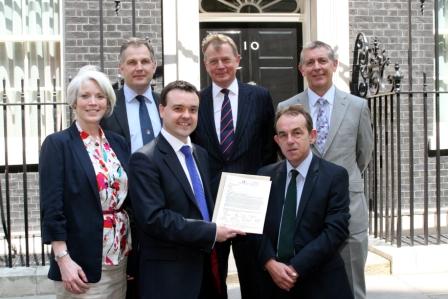
Renewable energy to bring £25bn of investment into UK economy
Changes to subsidies for renewable electricity could incentivise between £20 billion and £25 billion of new investment in the economy between 2013 and 2017. The Banding Review for the Renewables Obligation will support jobs and deliver more clean power with a reduction in costs to consumers between 2013 and 2015, Ministers said.
Bandings were today set for renewable technologies under the Renewables Obligation – the Government’s main mechanism for supporting large-scale renewables – for the period 2013-17 (2014-17 for offshore wind). This comes ahead of the Government’s Global Investment Conference and series of 17 business summits taking place at the British Business Embassy at Lancaster House during the upcoming Games, which aim to secure further investment into the UK.
Edward Davey, Secretary of State for Energy and Climate Change, said:
“Renewable energy will create a multi-billion pound boom for the British economy, driving growth and supporting jobs across the country.”
“The support we’re setting out today will unlock investment decisions, help ensure that rapid growth in renewable energy continues and shows the key role of renewables for our energy security.”
“Because value for money is vital, we will bring forward more renewable electricity while reducing the impact on consumer bills between 2013 and 2015, saving £6 off household energy bills next year and £5 the year after.”
The Banding Review sets out that:
Support for onshore wind from 2013-17 will be reduced by 10% to 0.9ROCs, as consulted on in Autumn 2011. This level is guaranteed until at least 2014 but could change after then if there is a significant change in generation costs. A call for evidence on onshore wind industry costs will be launched this Autumn and report in early 2013. If the findings identify a significant change, the Government will initiate an immediate review of ROC levels with any new support arrangements taking effect from April 2014, with grandfathering and grace periods for projects already committed. The call for evidence will also consider how local communities can have more of a say over, and receive greater economic benefit from, hosting onshore windfarms;
Rates of support for offshore wind will reduce as the cost of the technology comes down during the decade;
Support levels for certain marine energy technologies will more than double from 2ROCs to 5ROCs per MWh, subject to a 30MW limit per generating station;
There will be a new band to support existing coal plant converting to sustainable biomass fuels. This will increase the amount of renewable energy produced at less cost to consumers; and
There will be no immediate reduction in support for large-scale solar, but there will be a further consultation this year on reduced support levels given recent dramatic falls in costs.
These proposals are expected to bring forward 11 TWh more renewable energy in 2016/17 than current bandings, and stimulate between £20bn and £25bn of new investment. The proposals also provide industry with the certainty needed to make near-term investment decisions.
Gas
Alongside its plans for renewables the Government is also committed to ensuring that the UK is an attractive location for gas investors.
The Government will set out its gas strategy in the Autumn, and is today confirming that it sees gas continuing to play an important part in the energy mix well into and beyond 2030, while meeting our carbon budgets. Through the 2020s, and beyond if gas proves cheap, we expect it to continue to play a key role ensuring that we have sufficient capacity both to meet everyday demand and complementing an increasing amount of relatively intermittent and inflexible generation. We do not expect the role of gas to be restricted to providing back up to renewables, and in the longer term we see an important role for gas with CCS.
This role will be supported by making best use of UK energy resources and the Government is also today announcing the introduction of a £500m field allowance for large shallow water gas fields, to secure investment in marginal gas fields in the UK Continental Shelf.
The gas generation strategy will set out in more detail how the Government, whilst meeting its broad decarbonisation objectives will ensure investment in gas generation plant and how it will fulfil its commitment to ensure that if gas prices fall UK families and businesses will be able to benefit from lower bills.
Notes for editors:
Absolute contribution to average household electricity bills of RO support costs under current bands and the revised bands
£2011 prices
2013/14
2014/15
2015/16
Current bands
44
47
49
50
Revised bands
38
42
50
53
Difference between revised and current bands
-6
-5
1
3
(Using household electricity demand before the impact of other policies)
5. Bandings for all technologies:
Table 1 – Bandings under the Renewables Obligation
Renewable electricity technologies
Current support (2012-2013) ROCs per MWh

